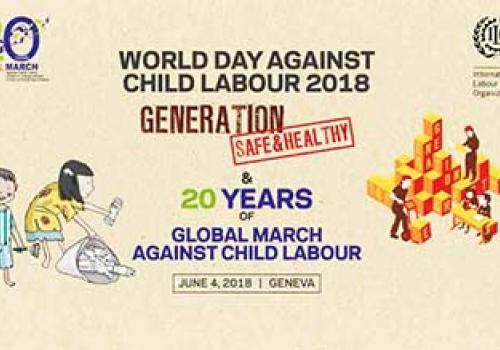#GenerationSafe&Healthy
Today, 12th June, 2018 the Southern African Development Community (SADC) joins the global community in commemorating the World Day Against Child Labour. On this occasion, SADC notes with great concern that despite progress in reducing the number of children in child labour, as many as 152 million children (one in ten children) are still in child labour in the world today. Of those in child labour, 73 million are in hazardous work mostly in agriculture, mining and construction while 114 million are aged between 5 and 14 years. In absolute terms, almost half of child labour (72.1 million) is to be found in Africa.
Despite this bleak picture, it is reassuring that all the SADC Member States have taken bold steps in the fight against child labour most notably through universal regional ratification of the Minimum Age Convention, 1973 (No. 138) and the Worst Forms of Child Labour Convention, 1999 (No. 182). All SADC Member States have also ratified the United Nations Convention on the Rights of the Child, 1989, which commits state parties “to recognize the right of the child to be protected from economic exploitation and from performing any work that is likely to be hazardous or to interfere with the child's education, or to be harmful to the child's health or physical, mental, spiritual, moral or social development.”
These international commitments have been domesticated in the SADC Code of Conduct on Child Labour, which requires Member States to take the following measures:
a) Develop and implement national policies and programmes of action on child labour
b) Establish data banks on child labour to enhance awareness and action against child labour
c) Enact preventive legislation and strengthen enforcement mechanisms
d) Prioritize education and training for children
e) Provision of health, welfare and social protection taking into account the impact of HIV and AIDS on children
f) Eradicate poverty, which is a push factor for child labour
g) Strengthen partnerships, including with employers and workers
SADC recognizes that children must not be robbed of their childhood due to work and that they should have access to affordable, quality and uninterrupted education at least up to the general minimum age for entry into employment of 15 years. SADC’s position is that quality education is the most effective instrument for the elimination of child labour, poverty and other social ills, and for ensuring sustainable development through the contribution of a skilled, well trained and productive labour force.
The commemoration of the 2018 World Day Against Child Labour reminds us of our duty to ensure that children live the life they deserve today and in future when they are adults. It reminds us that there can be no social justice or progress if the foundations for tomorrow, which are the children, are not sufficiently protected against child labour and all forms of abuse. Effective and concerted action against child labour globally and regionally is indeed an urgent matter because once lost, childhood cannot be restored.
Therefore, SADC takes the opportunity of the World Day Against Child Labour to reaffirm its commitment to the realization of Sustainable Development Goal (SDG) no. 8 on employment and economic growth, specifically target 8.7 which seeks to eradicate all forms of child labour by 2025, among other targets. SADC will prioritise the strengthening of policies and legislation against child labour as well as the enhancement of labour inspection systems, data collection and reporting through the SADC Monitoring and Evaluation Tool on Child Labour.
As the world commemorate this day, SADC calls on the entire global community to remain steadfast in the fight against child labour through well-coordinated multi sectoral partnerships involving the children themselves, governments, employers’ and workers’ organizations, International Cooperating Partners, civil society, and other players including the communities where children reside, who have an equally important responsibility for the protection of children overall.
Dr Stergomena Lawrence Tax
SADC Executive Secretary
Gaborone, Botswana 12th June, 2018

